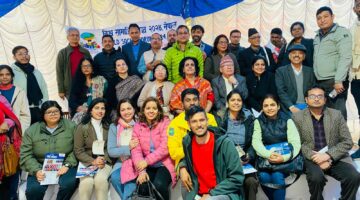Taranath Dahal
The Open Government Partnership (OGP), a global initiative launched since September 2011, has been expanding. So far, 75 countries have joined this platform, but Nepal is yet to join it. Among the south Asian countries, Sri-Lanka joined OGP in 2014 while Pakistan and Afghanistan in 2015. Civil society has been demanding and recommending Nepal to take part in OGP since its inception. Last year, the Government of Nepal itself participated in OGP summit and formed a High Level Working Committee. The Committee provided a report on importance of OGP and recommended the Government that it joined the global bandwagon. Freedom Forum had hoped that Nepal would declare its partnership in the fourth OGP Summit held from 7 to 9 December 2016 in Paris. Despite participation of distinguished authorities in the Summit, Nepal failed to announce its participation in the OGP. It was because the political and administrative representatives showed dilemma on decision-making. It is really a worrying fact that Nepal failed to show high level of political commitment on ensuring transparent, accountable and pro-people governance in the country.
At a time when the country has promulgated new constitution, and witnessed voices for country’s headway to economic prosperity from transitional politics, and a huge amount is being spent in the post-earthquake reconstruction activities, the Government could earn good repute if it had participated in the OGP. Good governance is the most sought after matter to bring positive change in people’s life. For this, the democratic government has the role to play.
Nepal has met the minimum criteria to be eligible for the membership of OGP. We have RTI Act in place. Both the government and CSOs efforts are positive for the effective implementation of this Act. The political and administrative officials in Nepal need to periodically provide their property details to the government. However, compliance with the proactive disclosure provision must be strict. Similarly, efforts are underway to ensure transparency and quality in Nepal’s budget system. Nevertheless, out of eight essential documents of budget, six are prepared and disseminated through internet for people’s information. There are still not sufficient information on these. Similarly, the practice of pre-budget discussion has begun, but people’s easy access to all information on budget is yet to ensured. In order to guarantee people’s participation in public affairs, it is essential to promote the culture of people’s cooperation and engagement with State agencies and bring policy reforms. It does not mean we do not have any policy and legal mechanism for it. For instance, there is 14-set planning process where the targeted group can provide their suggestions. As Nepal has accepted minimum guidelines of OGP, it is eligible to be the OGP member. In addition to this, Nepal is in need of open and transparent government, collaboration and cooperation between government and people. Those in power still exhibit the behavior as if they are not people’s representatives. It has contributed to badly shrink the civic space, thereby panicking CSOs.
With this in the background, Nepal needs to participate in the OGP without delaying the guarantee of transparent and accountable governance and recognition of CSOs as the partners to take up people’s voices. Recently, Nepal has taken a positive step in the open contracting. The positive efforts are seen in the parliamentary transparency. Debate has begun at the government level on open government data.
Another laudable point to share here is- The Office of the Company Registrar has archived data under the Pvt and Public Ltd showing ensuring ownership transparency. The issue of transparent investment on media has come to fore on policy level. So, time has come to promote these improvements and continue good governance with the internalization of OGP concept. Delaying partnership with OGP, Nepal is to waste its valuable time.
In today’s technically innovative era, extensive use of information technology in conducting state mechanism is beneficial to the overall development. OGP also encourages innovative application of technology to eliminate existing maladies like corruption, prejudice, delayed activities, and to increase government’s capacity, to ensure public participation through teamwork and to achieve maximum result in shortest possible time. To this motive, its firm footsteps towards national and sub-national level are necessary.
As Nepal has adopted a federal set up with seven provinces and is in the process of establishing 719 local units, embracing OGP with national commitment is imperative. More important is to establish transparent and accountable governance with the development of broader partnership and coordination among public and private sector. Let’s hope, Nepal joins OGP soon.
Source: Message from Executive Chief
Free Expression, Issue 36, October to December 2016

